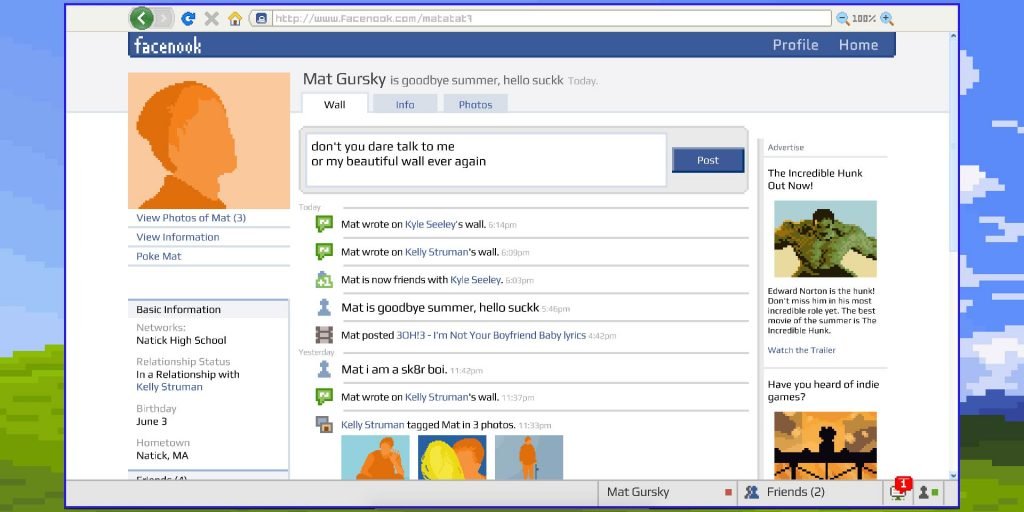The late film critic Roger Ebert once stated that “video games can never be art”. He then went on to defend this viewpoint in an article wherein he discusses a few artistic games, namely Braid and Flower. In the article, Ebert makes one thing perfectly clear: he’s never played the games he’s discussing, and he never will.
Ebert was never qualified to talk about the artistic merits of games. He lacked any firsthand experience, completely resistant to the idea of even trying a video game. Otherwise, he might have known that yes, games can be art. Of course they can. Games stir emotion in a unique way, by immersing their audience in a particular role. And while games like Red Dead Redemption or The Last Of Us can be emotional at times, smaller indie titles are often emotionally resonant throughout. Take a look at these games which are, without question, emotional works of art.
10/10 Emily is Away <3


Emily is Away <3 takes place in 2008. It’s an odd example of nostalgia for this time period. In the game, the protagonist leaves their favorite messaging app, AIM, because no one uses it anymore. Instead, they use ‘Facenook’, where the interactive novel-style gameplay happens.
This shift represents anxiety around the protagonist’s changing world. High school is ending for them. Themes of love, friendship, transition, and nostalgia are explored through the game’s beautifully written characters. There’s also “YouToob”, an immersive HTML website created just for the game. Watching old meme videos and listening to music from the time period really adds to the bittersweet atmosphere.
9/10 Papers, Please


This well-known game is the story of an immigration officer in the fictional communist country of Arstotzka. The player must bend to bureaucracy, maintaining a perfect performance at the risk of their own pay. And because they have a family to feed, pay is all-important.
Papers, Please illustrates many of the difficulties of living under authoritarianism, but one in particular. Some have wondered why revolutions aren’t more common under authoritarian governments. It’s because revolutions come up from the bottom, and sometimes the people on the bottom have to look out for themselves. In Papers, Please, the player is on the bottom. Even bending the rules for a small favor means their family doesn’t eat. It’s as simple as that.
8/10 Hypnospace Outlaw


Hypnospace Outlaw is another interactive novel-style game which takes place on a fake computer. The player character has been hired by the company Merchantsoft to act as a freelance moderator for their web service: “Hypnospace”.
Hypnospace Outlaw explores themes of belonging, nostalgia, and capitalism. It’s a charming, hilarious experience. The characters and their webpages are extremely loveable, and the care that went into crafting them is obvious. Even the villain is well-written. Also to the game’s credit, it contains hundreds of original songs. Some of the songs are amazing, and all of them are worth listening to at least once.
7/10 Celeste


Celeste is a difficult platformer requiring lots of trial and error. The game’s main character, Madeline, struggles with anxiety and self-doubt as she climbs Mt. Celeste — a representation of life’s difficulties. Celeste seems to resonate, especially, with those who suffer from depression. When you’re depressed, every part of life can feel like an uphill battle. The simplest tasks become grueling, like mountain climbing.
Celeste contains touching, helpful lessons for all who play it; not just those who struggle with mental illness. It also resonates with the LGBT community, as its protagonist is transgender. Sadly, anxiety and self-doubt are common foils for many trans women, hence the appropriateness of Celeste’s uplifting message.
6/10 The Beginner’s Guide


The Beginner’s Guide is the second published game by Davey Wreden, who also developed The Stanley Parable. Davey is also the game’s narrator, and one of two main characters.
The story seems to contain elements from Wreden’s own life and his own struggles with game design. In the game, Davey leads the player through several half-finished games made by a friend of his named Coda. As they play Coda’s games, Wreden asks the player to imagine what sort of person he was. Without trudging into spoiler territory, the game has some beautiful things to say about game design, creativity, and personal insecurity.
5/10 Gone Home


Gone Home is a storytelling game. It has light gameplay elements (known by most as a “walking simulator”), but it’s still a great game. It also prominently features LGBT characters, being one of the first video games to do so. The game’s beautiful story revolves around romance, prejudice, and acceptance.
In Gone Home, a woman named Katie is returning from a trip overseas. She arrives at her family’s new home, only to find it empty. As Katie investigates the house, she pieces together the story of what happened, and why everyone is missing. It’s difficult to discuss the plot of Gone Home without spoiling it, so we won’t.
4/10 Lisa: The Painful


Actually a trilogy of games, the second game in the series (“Lisa: The Painful”) is generally the most recognized and discussed. Lisa: The Painful puts players in the shoes of Brad Armstrong, a drug-addled mess of a man. Just as a warning, it also contains depictions of abuse.
In terms of gameplay, Lisa is essentially an Earthbound clone, but a well-made one. In terms of story, funnily, it’s sort of like The Last Of Us. Yet it explores its themes more deeply, and with far better comic relief. At a certain point, parenting becomes overbearing. It crosses a line. It becomes less about the child, and rules are imposed by the parent mostly for their own satisfaction. Lisa asks the question “where is that line?”
3/10 Firewatch


In Firewatch, a man named Henry gets a new job as a fire lookout in Shoshone National Forest. He soon starts chatting with another fire lookout named Delilah, and what seems like a simple romance story soon unfolds into something else.
In life, we are often our own worst enemies. It can be easy for us to get stuck in our own heads. We like to dwell on our imperfections and things we think we should be doing differently. This is Henry’s main struggle in the game. His journey to overcome guilt surrounding his ex-wife and paranoia about his place in the world is an utterly gripping one. Aided by top-notch art and voice acting, Firewatch is a classic emotional game.
2/10 Undertale


Undertale is another Earthbound clone, the most well-known game in this subgenre by far. In the game, a child (“Frisk”) falls deep underground, into a world of monsters. It’s an extremely heartfelt game that explores themes of friendship and game design itself.
One tool Undertale uses exceptionally well to strike an emotional response is music. It’s completely littered with leitmotifs and other recurring melodies. Related characters have related theme songs. This is often not noticed by players until their second playthrough, adding to the emotional reaction when they finally do notice. It helps, too, that Toby Fox is a talented composer. Expect goosebumps when listening.
1/10 Disco Elysium


Disco Elysium is an absolute masterpiece of a detective RPG. In addition to its stellar humor, the game has moments of poignant beauty. As an examination of culture and politics, it asks its players to grapple with meaningful questions. How would you handle the rigors of police life? How far could you fall into drug abuse? Who truly benefits from our political systems? Can you handle criticism of your own ideology?
In this 20-hour game, most of which is dialogue, almost every line is either funny or poignant. And that’s good because as storytellers know, both are needed. As an audience, we compare emotional moments against moments of levity. It’s like a roller coaster — a good story has ups and downs. Because Disco Elysium has both in great measure, it’s immensely satisfying.
- amazon prime gaming
- axie infinity
- Casino Games
- Celeste
- coingenius
- Disco Elysium
- Disco Elysium: The Final Cut
- DualShockers Definitives
- Dualshokers
- EA Sports
- Emily is Away
- Emotional
- Evil Geniuses
- Firewatch
- Gaming
- gaming headset
- gaming pc
- gone home
- Hypnospace Outlaw
- Indie
- Indie Games
- Lisa
- Lisa: The Painful RPG
- madden nfl
- Nintendo
- Online casino games
- Originals
- Papers Please
- pc games
- plato
- plato ai
- plato data intelligence
- plato game
- plato gaming
- platodata
- platogaming
- playstation
- prime gaming
- Team SoloMid
- the beginner's guide
- Undertale
- xbox
- zephyrnet












